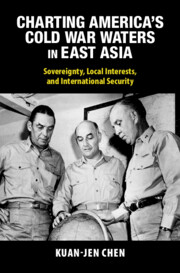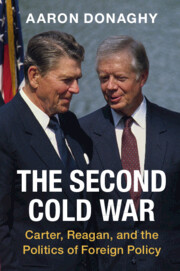Charting America's Cold War Waters in East Asia
Shifting the focus from land to sea when considering the Cold War in East Asia, Kuan-Jen Chen sheds light on the importance of the 'oceanic' lens as a structural imperative in grand strategic thinking. Despite extensive scholarship on postwar US-East Asia relations, questions about the relationship between maritime space, national sovereignty, and geopolitics have not been fully explored. Drawing on archives in Chinese, English, and Japanese, Chen uses the western Pacific as a historical platform, illustrating the relationship between the geopolitical value of the sea and the strategic deliberations of American and East-Asian decision making. The recent deterioration of US-China relations has turned maritime East Asia into a powder keg, with no country in the region able to remain neutral. By anchoring today's maritime East Asia in the past, this book traces the evolution of historical factors that led to the current status quo in the western Pacific, and shows the origins of controversial issues in the region.
- Enriches our understanding of Cold War history by using a maritime perspective
- Draws on archives in Chinese, English, and Japanese to reveal the multiple perspectives of maritime space shaping
- Reveals the historical origins of our contemporary maritime disputes
Reviews & endorsements
'Kuan-Jen Chen has written a well-researched, original, and persuasive history of America's struggle to develop a strategy for control of Asia's maritime arena during the Cold War. Chen's discussion of the complications created by local competition over natural resources and territorial waters makes an especially welcome contribution to our understanding of the Cold War in Asia.' Marc Gallicchio, Villanova University
'Bringing together an impressive array of documents from the United States, China, and Japan, Kuan-Jen Chen reveals how American maritime power in East Asia emerged after World War Two and in the process created ties that continue to shape the region today.' Elizabeth Ingleson, London School of Economics and Political Science
'Kuan-Jen Chen's book provides a comprehensive understanding of Cold War history, specifically emphasizing how the dynamics of the Cold War were shaped in maritime East Asia. It offers valuable insights into the complexities of the relationship between the US and Cold War East Asia.' Shin Kawashima, University of Tokyo
'Kuan-Jen Chen's excellent book opens up a new perspective in the history of the Cold War in East Asia. This is an enviably ambitious piece that is not afraid of tackling the big questions. Kuan-Jen should be congratulated for such a compelling, original, and penetrating work.' Hsiao-ting Lin, Hoover Institution, Stanford University
Product details
No date availableAdobe eBook Reader
9781009418768
0 pages
Table of Contents
- Introduction
- 1. Finding a Local Partner in Postwar Maritime East Asia
- 2. The Creation of a Mainland-based Forward Strategy
- 3. Vying for Top Dog: the Navy-Army Struggle in Maritime East Asia
- 4. Termination of the Mainland-based Forward Strategy
- 5. The 1950 Crises and America's Changing Posture of Defence
- 6. The Making of a New Maritime Strategy
- 7. The International Law of the Sea and America's Unreliable Partners
- 8. America's Strange Bedfellows in the International Arena
- 9. Fishing for Protein in Cold War East Asia
- 10. Jostling for Position: Black Gold, Natural Resource Exploration and Shifting Political Contours
- Epilogue
- Bibliography.










